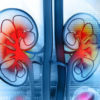Irritable Bowel Syndrome Treatment in Northern New Jersey
Irritable bowel syndrome is a common gastrointestinal disorder characterized by abdominal pain and altered bowel habits (e.g. constipation, diarrhea, or both). Patients with conditions such as irritable bowel syndrome can find comprehensive care from the board-certified gastroenterology team at Bergen Medical Associates in New Jersey. The physicians at Bergen Medical Associates work collaboratively to deliver personalized care and ensure the best possible outcome for each patient.
What Is Irritable Bowel Syndrome?
Irritable bowel syndrome (IBS) is a group of related symptoms that affect a person’s digestive system. IBS is typically characterized by abdominal pain, cramps, changes in bowel habits, and frequent gas. While IBS is uncomfortable, it is quite common: It’s estimated that IBS affects about 12% of people in the United States.
IBS is sometimes confused with inflammatory bowel disease (IBD), but the two are quite different. Doctors classify IBS as a functional gastrointestinal disorder, meaning normal bowel function is affected. In contrast, IBD is a group of diseases (including Crohn’s disease and ulcerative colitis) that cause chronic inflammation in the intestines. IBD, unlike IBS, can be detected on a colonoscopy or imaging test and can require surgery. IBS is not a cause of IBD and having IBS does not put patients at greater risk of developing IBD.
IBS is often classified by its primary symptoms:
- IBS with constipation (IBS-C)
- IBS with diarrhea (IBS-D)
- IBS with mixed bowel habits (IBS-M)
Treatment plans may be tailored to the patient’s most prevalent symptoms.
What Are the Symptoms of Irritable Bowel Syndrome?
Signs of IBS can vary from patient to patient, but common symptoms include:
- Changes in bowel movement appearance and frequency
- Abdominal cramping, pain, or bloating
- Diarrhea or constipation
- Excess gas
- Mucus in the stool
- Weight loss
A diagnosis of IBS is typically indicated when these symptoms are present for at least three days per month, over three months or more.
What Are the Risk Factors for Irritable Bowel Syndrome?
Certain patients are more likely to develop this condition than others. Risk factors for IBS include:
- Genetics: Patients with a family history of IBS are more at risk.
- Age: IBS is most frequent in patients under the age of 50.
- Gender: IBS is more common among female patients than male patients.
- Medical and mental health history: Patients who have experienced anxiety, depression, or abuse are more likely to have IBS.
While it is not clear what causes IBS, certain triggers can cause IBS symptoms to flare up. Some patients find their IBS symptoms are worse when they are under a great deal of stress. Other people find that certain foods, such as wheat, dairy products, or carbonated beverages, make their IBS worse.
How Is Irritable Bowel Syndrome Diagnosed?
There is no definitive diagnostic test for IBS. If a patient reports persistent IBS symptoms, their doctor will typically begin with a complete physical examination and medical history to rule out other types of inflammatory bowel disease and related conditions. They may order tests such as:
- Imaging: Patients may have a CT scan or an ultrasound if their doctor suspects their symptoms are caused by ulcerative colitis, Crohn’s disease, or an infection.
- Stool study: A stool culture can check for infections or diseases.
- Blood work: Blood tests can help rule out conditions like anemia or celiac disease
- Breath tests: Breath tests can help evaluate for small intestinal bacterial overgrowth and some specific dietary intolerances.
- Colonoscopy: This test may be recommended if a patient’s symptoms are potentially due to inflammatory bowel disease or colon cancer.
Are There Treatment and Lifestyle Changes?
Many patients manage IBS with both lifestyle changes and medication. Dietary changes that can help mitigate IBS symptoms include:
- Eating high-fiber foods or taking a fiber supplement
- Drinking more water
- Avoiding caffeine
- Limiting dairy products such as milk and cheese
- Keeping a food diary to identify foods that trigger flare-ups
- Eating five or six small meals instead of three big meals each day
- Taking probiotic supplements
Quitting smoking, exercising regularly, and practicing meditation or relaxation techniques may also help reduce IBS flare-ups. Some patients benefit from over-the-counter or prescription medications to help with constipation, diarrhea, or abdominal pain. A doctor may recommend prescription medications based on whether a patient has IBS-C, IBS-D, or IBS-M.
Contact Bergen Medical Associates in Northern New Jersey
At Bergen Medical Associates, a board-certified team of primary care physicians and gastroenterologists offers coordinated care for patients with IBS and other types of inflammatory bowel disease. Taking a comprehensive approach to patient care, Bergen Medical Associates’ practitioners treat patients at every stage of health and offer multiple specialties under one roof. Bergen Medical Associates serves patients throughout New Jersey and has multiple office locations. For more information, request an appointment today.










